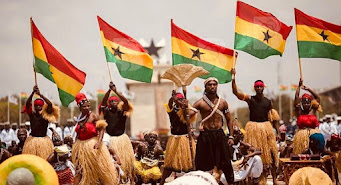The historical origin of the name "Ghana”
The
origin of the name "Ghana” is steeped in historical significance,
encapsulating the essence of the nation's identity. Prior to March 6th, 1957,
Ghana was known as the Gold Coast, a title bestowed upon her by her colonial
rulers.
The
origin of the name "Gold Coast” has a historical significance. It was
bestowed upon the land by European colonizers due to the abundant presence of
gold, which the indigenous people were willing to trade for various goods such
as gunpowder, glass, and clothing. This indicates that the Gold Coast, both in the
past and present, was indeed a region rich in gold.
In
1957, our forefathers made the significant decision to transition from Gold
Coast to Ghana. This change held great importance as it symbolized the desire
for self-identity and complete independence among our patriotic ancestors. The
selection of the name "Gana" (Ghana) was rooted in historical
significance.
To
locate the present-day area associated with the ancient Ghana Empire that
emerged and thrived in the eleventh century, it is theorized that the
inhabitants of the Ghana Empire migrated to the aforementioned region.
The
second rationale for selecting Ghana was the economic linkage between the
ancient Ghana Empire and the present-day region. The ancient Ghana Empire was
renowned for its abundant mineral resources, including gold, iron, copper, and
diamonds. This influenced our forefathers to deem it fitting to bestow upon the
current region the name of its historical predecessor.
The
third rationale for selecting Ghana is rooted in the etymology of the name
"Gana," which is believed to signify "Warrior King." Given
that our ancestors resisted colonial domination through armed struggle,
adopting the name "Gana" as "Ghana" would be a fitting
tribute to their legacy.
It is
widely believed that Joseph Boakye Danquah, a prominent member of the Big Six,
was the one to propose the name "Ghana" upon the country's attainment
of independence.
Credit: Governor




